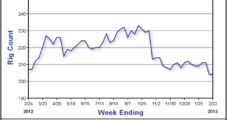New Brunswick could see C$13 million in development for every shale gas well drilled in the province, opening up opportunities for the province to prosper, according to an analysis by Deloitte. However, a recent poll found that critics of development are gaining support.
Disclose
Articles from Disclose

Controversy Gushes from Reservation in Bakken
Lawsuits have been filed in federal and state courts over a part of North Dakota’s prosperous Bakken Shale that lies under the Fort Berthold Reservation, which according to the state’s latest statistics makes up nearly 20% of the play’s ever-growing oil production.
Attorneys: Challenges Ahead, But Fracking Coming to New York
A pair of attorneys with extensive knowledge of New York’s regulatory, business and geological climates said the rules proposed by the state Department of Environmental Conservation (DEC) governing high-volume hydraulic fracturing (HVHF) won’t hamper development of the state’s shale plays, and they believe permits will be issued soon.
California Senate Rejects Fracking Bill; Second Measure Alive
California lawmakers on Thursday rejected an industry-opposed bill (SB 1054) on hydraulic fracturing (fracking), but a second fracking measure (AB 591) is still alive.
Lawmaker: Drilling Foes Spreading Hysteria Over Act 13
Pennsylvania House Speaker Sam Smith (R-Punxsutawney) accused opponents of shale gas drilling of spreading misinformation about Act 13, calling their claims that the law’s language on chemical disclosure would prevent doctors from treating their patients “outrageous.”
Volunteers? California Regulators Request Fracking Information
The California Department of Conservation (DOC) is requesting that oil and natural gas operators voluntarily disclose where they are using hydraulic fracturing (fracking) for their drilling operations and what chemicals are being used in the process. Meanwhile, the state legislature has reintroduced a proposal to require the drilling information, which already has been enacted by several states across the country and is being voluntarily disclosed by many of the biggest operators in the shale business (see Shale Daily, March 30).
Environmental Groups File Fracking Complaint with Wyoming Court
A consortium of environmental groups has filed a petition with a Wyoming district court, seeking to require the state Oil and Gas Conservation Commissions to disclose information about specific chemicals used in the hydraulic fracturing (fracking) of oil and natural gas wells that are being kept confidential for proprietary business reasons.
People
Mike Graham, president of Encana Corp.’s Canadian Division, has resigned from the company. Encana, the largest natural gas producer in Canada, did not disclose the reasons. Mike McAllister, who is senior vice president of the Canadian Division, was tapped to take over. Graham has run Encana’s entire Canadian operations since 2007, which has resource play assets in British Columbia, Alberta and Atlantic Canada. Graham joined one of Encana’s predecessor companies in 1986 and held various positions in operations and engineering before moving to the reservoir engineering group. He helped to develop Encana’s Suffield and Primrose interests, as well as the AECO natural gas storage facility. Graham also led the company’s entry into the Deep Basin of Alberta and northeastern British Columbia.
Interior to Call for Frack Chemicals Disclosure on Public Lands
The U.S. Department of Interior’s Bureau of Land Management (BLM) would require companies drilling on public lands to disclose the chemicals used in their hydraulic fracturing (fracking) operations, according to a draft of proposed BLM regulations acquired by NGI.
Interior to Call for Disclosure of Frack Chemicals on Public Lands
The U.S. Department of Interior’s Bureau of Land Management (BLM) would require companies drilling on public lands to disclose the chemicals used in their hydraulic fracturing (fracking) operations, according to a draft of proposed BLM regulations acquired by NGI’s Shale Daily.




